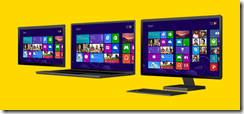Windows 8 Upgrade Tips
With Black Friday just over a week away, I’m starting to get e-mails and questions from friends and family about what type of machine to buy and what version of Windows 8 to run for that matter.
As for machines, obviously I have a soft spot for Microsoft Surface, but for those wanting to buy now, there’s only the Windows RT option (an ARM device). It’s a fantastic slate device, but isn’t likely going to fit the bill as a replacement machine for those running Windows 7, Vista, or XP. The RT versus Windows 8 differentiation can be a tad difficult to fully grasp, so I encourage those interested in the Surface to take a look at the side-by-side comparison of the models.
 Microsoft has always had a thriving ecosystem of hardware vendors, and with the new touch-first nature of Windows 8, there’s a broader selection of options than ever. From desktops, to laptops, to ultrabooks, to convertibles, to slates. It’s such a personal choice, that I typically shy away from specific model recommendations and steer people to the buying guide or the PC Selector. The latter is especially good for those that aren’t sure what machine profile they want, since it bases the results on a few questions about one’s usage patterns and budget.
Microsoft has always had a thriving ecosystem of hardware vendors, and with the new touch-first nature of Windows 8, there’s a broader selection of options than ever. From desktops, to laptops, to ultrabooks, to convertibles, to slates. It’s such a personal choice, that I typically shy away from specific model recommendations and steer people to the buying guide or the PC Selector. The latter is especially good for those that aren’t sure what machine profile they want, since it bases the results on a few questions about one’s usage patterns and budget.
As for what version of Windows 8 to go for, there’s a handy comparison chart showing the options. There are three in total, but it’s even easier than that:
- If you purchase a new ARM device (like Surface) it will come with Windows RT, and there’s nothing you really need to do.
- If you purchase a laptop, desktop, ultrabook, etc., it will come with either Windows 8 or Windows 8 Pro depending on the vendor or model.
- If you’re looking to upgrade an existing machine, then Windows 8 Pro is the way to go, and you can download it on-line for $39.99 (through January 31, 2013). The download process is risk-free, since it will automatically run the Windows 8 Upgrade Assistant to make sure your machine is Windows 8-ready before you pay for and download the upgrade.
For those developers our there planning to do Windows Phone development, there are definitely two things you want to ensure your (new) machine has:
- 64-bit version of Windows 8 to support the Windows Phone SDK.
- a SLAT-capable processor (to support the Windows Phone emulator within Visual Studio). I suspect most (if not all) new machines will meet this requirement, but if you’re upgrading Windows on older hardware, you may want to double-check for SLAT (and perhaps put that request into your boss for a new machine!)